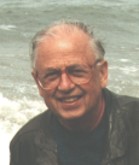|
Dr. Hans J. Zweig
 was born 1927 in Essen, Germany and emigrated
to the US with his family in 1938. He obtained a B.A. in Mathematics from the U. of R., an M.A. from Brown, and a Ph.D. from Stanford. was born 1927 in Essen, Germany and emigrated
to the US with his family in 1938. He obtained a B.A. in Mathematics from the U. of R., an M.A. from Brown, and a Ph.D. from Stanford.
He was active in research, teaching, consulting, and
management. Since 1984 he has been writing and traveling. His interest in Einstein’s work stems from his early contact with Prof. F. Kottler, a Viennese physicist mentioned by Einstein as contributing to
the development of his General Relativity Theory.
Einstein contends in his Special Relativity Theory that time is relative. He means that observers on two bodies in relative motion cannot have clocks that are
synchronized. Each observer experiences the clock of the other as running more slowly than his own. But consider a situation in which one body is in an elliptical
path around another one. The two observers can decide in advance to set their clocks to the same time when the first body is at apogee (farthest from the
second body). This event occurs simultaneously for the two bodies – a shared moment in time. No communication is necessary to set the clocks, so the
problem Einstein raised, that the finite speed of light prevents synchronization, is circumvented! An analysis of his arguments shows why he reached the wrong conclusion.
|

